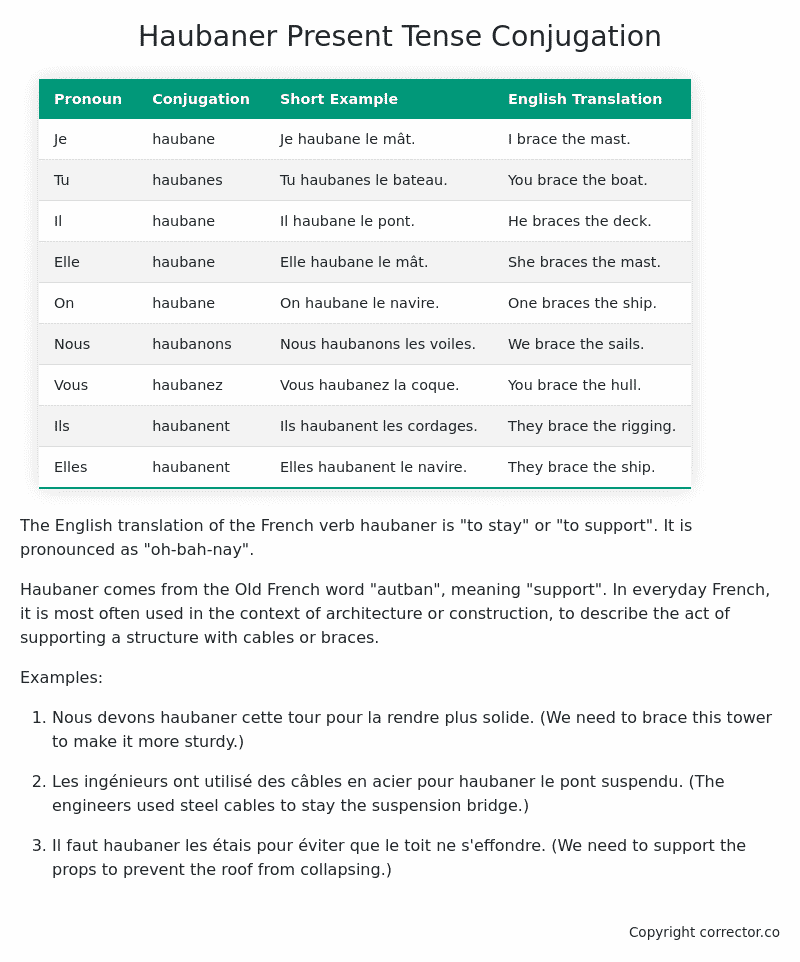Le Present (Present Tense) Conjugation of the French Verb haubaner
Introduction to the verb haubaner
The English translation of the French verb haubaner is “to stay” or “to support”. It is pronounced as “oh-bah-nay”.
Haubaner comes from the Old French word “autban”, meaning “support”. In everyday French, it is most often used in the context of architecture or construction, to describe the act of supporting a structure with cables or braces.
Examples:
-
Nous devons haubaner cette tour pour la rendre plus solide. (We need to brace this tower to make it more sturdy.)
-
Les ingénieurs ont utilisé des câbles en acier pour haubaner le pont suspendu. (The engineers used steel cables to stay the suspension bridge.)
-
Il faut haubaner les étais pour éviter que le toit ne s’effondre. (We need to support the props to prevent the roof from collapsing.)
Haubaner – About the French Present Tense
To take a deep dive into all the French tenses then see our article on Mastering French Tense Conjugation.
Common Everyday Usage Patterns For Le Present
Interactions with Other Tenses
Table of the Present Tense Conjugation of haubaner
| Pronoun | Conjugation | Short Example | English Translation |
|---|---|---|---|
| Je | haubane | Je haubane le mât. | I brace the mast. |
| Tu | haubanes | Tu haubanes le bateau. | You brace the boat. |
| Il | haubane | Il haubane le pont. | He braces the deck. |
| Elle | haubane | Elle haubane le mât. | She braces the mast. |
| On | haubane | On haubane le navire. | One braces the ship. |
| Nous | haubanons | Nous haubanons les voiles. | We brace the sails. |
| Vous | haubanez | Vous haubanez la coque. | You brace the hull. |
| Ils | haubanent | Ils haubanent les cordages. | They brace the rigging. |
| Elles | haubanent | Elles haubanent le navire. | They brace the ship. |
Other Conjugations for Haubaner.
Le Present (Present Tense) Conjugation of the French Verb haubaner (this article)
Imparfait (Imperfect) Tense Conjugation of the French Verb haubaner
Passé Simple (Simple Past) Tense Conjugation of the French Verb haubaner
Passé Composé (Present Perfect) Tense Conjugation of the French Verb haubaner
Futur Simple (Simple Future) Tense Conjugation of the French Verb haubaner
Futur Proche (Near Future) Tense Conjugation of the French Verb haubaner
Plus-que-parfait (Pluperfect) Tense Conjugation of the French Verb haubaner
Passé Antérieur (Past Anterior) Tense Conjugation of the French Verb haubaner
Futur Antérieur (Future Anterior) Tense Conjugation of the French Verb haubaner
Subjonctif Présent (Subjunctive Present) Tense Conjugation of the French Verb haubaner
Subjonctif Passé (Subjunctive Past) Tense Conjugation of the French Verb haubaner
Subjonctif Imparfait (Subjunctive Imperfect) Tense Conjugation of the French Verb haubaner
Subjonctif Plus-que-parfait (Subjunctive Pluperfect) Tense Conjugation of the French Verb haubaner
Conditionnel Présent (Conditional Present) Tense Conjugation of the French Verb haubaner
Conditionnel Passé (Conditional Past) Tense Conjugation of the French Verb haubaner
L’impératif Présent (Imperative Present) Tense Conjugation of the French Verb haubaner
L’infinitif Présent (Infinitive Present) Tense Conjugation of the French Verb haubaner
Struggling with French verbs or the language in general? Why not use our free French Grammar Checker – no registration required!
Get a FREE Download Study Sheet of this Conjugation 🔥
Simply right click the image below, click “save image” and get your free reference for the haubaner Present Tense tense conjugation!

I hope you enjoyed this article on the verb haubaner. Still in a learning mood? Check out another TOTALLY random French verb present conjugation!


